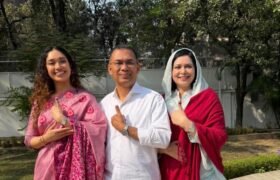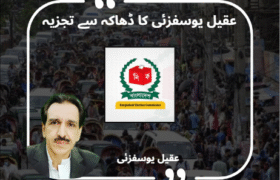Marking the World Press Freedom Day this year the theme announced by United Nations General Assembly is “Journalism Under Digital Siege”. In Pakistan and worldwide this day is observed to inform the people across the globe that the freedom of expression and opinion and freedom of the press are basic rights for all humans. But just like democracy in this century, the freedom of the press has also become fragile, while the surveillance and assault on journalists have increased. This Day also recalls people that to bring daily news and insight to the public many journalists have faced imprisonment and others lost their lives. Therefore, on World Press Freedom Day the efforts of media professionals are recognised.
On this occasion, Voice of KP asked some of the renowned journalists in Khyber Pakhtunkhwa who are working with national and international media about their comments on this year’s theme in perspective of Pakistan. The accumulated journalists shed light on the press freedom and environment for journalists as below:
“Journalism should be free but not unbridled, whereas journalism should not be a propaganda tool of any institution which is otherwise a violation of journalistic ethics. But unfortunately, a trend has started of opinion-making in journalism, whose main purpose is to provide information to the masses is now more involved in reporting their wishes to the public which is considered a crime for manipulating the people. As far as the freedom of journalists is concerned, it becomes the responsibility of those international platforms for journalists to set guidelines and limitations for the media professionals without the interference of government in it. The main role in formulating such concerns needs to be played by the All Pakistan Newspapers Society (APNS), Pakistan Federal Union of Journalists (PFUJ) and Pakistan Broadcasters Association (PBA). These three forums through a joint venture bring forth a code of conduct to allay the fears of journalists. At the same time, it is very important to protect the lives of journalists. Not only a few government institutions but several nationalists and violent groups oppress and threaten the journalists, most specifically the media personals from KP and Balochistan.” Aqeel Yousafzai (Senior Journalist, Analyst, Critique, Author and Expert on war-on-terror and Talibanization)
“There is no environment for independent and investigative journalism in Pakistan, only a handful of journalists are working on newsworthy stories. Fifteen years back, if any journalist had written a story on national interest, they hardly get mistreated. But in the last ten years, it has become a habit that if a story targets a specific scandal or is against anybody then the first thing they do is to abuse that reporter and main political parties are involved. Journalists get trolled on social media whereas in past the government used to tolerate and correct themselves on stories published against them during their regime. I believe that in this era of social media, actual journalism is practised near to none.” Ali Akbar (Bureau Chief at Dawn News)
“The most important rule of journalism is that to maintain your trust and your source needs to have faith in you that you will not disclose his/her name in return of authentic information as the credibility of journalist and security of the source are both at stake. But ever since the era of digital siege has begun both these parties have become insecure. Even when a piece of big news breaks its silence, sooner or later it becomes known who has given the news, through what channel and to whom. Now either the source gives information through proper cautions or without fear of anything, both are extreme points which has harmed secure journalism. Previously a journalist used to meet its sources physically but since things have become digital and virtual meetings are commenced which are monitored but several organisations due to which sources get disclosed. The public’s right to information is compromised as journalists have to fabricate their writing and reporting style so that they could keep themselves and their sources secure.” Mehmood Jan Baber (Senior Journalist with 24 years of experience in Print and Electronic media)
“As we all know that this year’s celebration regarding journalistic practices around the world focuses on the theme “Journalism Under Digital Siege”, with the aim to spotlight how recent developments in technological means of monitoring and surveillance impact journalism and freedom of expression. Likewise, we could also not detach ourselves from this new phenomenon. There is no denying the fact that technology has affected the mode of journalism, bad or good, this will need empirical research to determine. While in the pre-Internet world, freedom of expression and privacy were thought to only interact when journalists reported on public figures in the name of the right to know, the rights have become increasingly interdependent. This linkage reflects digital business models and the development of new surveillance technologies and large-scale data collection and retention. The changes pose risks in terms of reprisals against media workers and their sources, thereby affecting the free exercise of journalism. We, while living and doing journalism in this part of the world must take advantage of digital technology but not without keeping the ground realities of the region. We do not a sufficient percentage of literacy even, so media literacy is still a dilemma for people. One of our responsibilities is to report in a way that is not addressed only to the dot com generation but to the rest as well.” Bakht Zaman Yousafzay (Assistant Professor, University of Peshawar, Broadcaster, Writer and TV Anchor)
“On the one hand, digital media has made journalism easier. It has helped many people to get their voices heard. But on other hand, their accounts are being hacked and their digital security is threatened, which is why many writers are turning to self-censorship, the privacy of journalists is at stake. Because of his social media accounts, not only he but also his family’s privacy, his security, his day-to-day affairs, he is now a click away, which is why a journalist’s life has become more difficult.” Umer Farooq (Journalist at Voice of America)
However, this day is observed to widen the horizon of the importance of a free and fearless press as it is evident from the remarks of the above-mentioned media personalities that even in this era of advancements, the journalists and media organisations are still facing difficulties in the line of duty. 3rd May is celebrated to spread the awareness of free media’s role in providing information, functioning of the press, and to awaken the state to endorse the right to freedom of speech, expression and information. Whilst to make sure that journalists remain unmonitored and secure while providing information to the masses as a public good.




